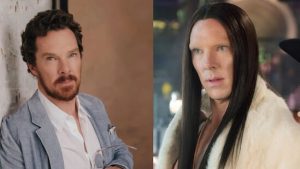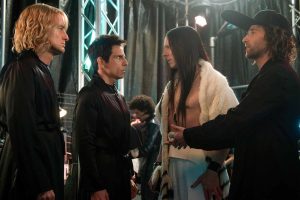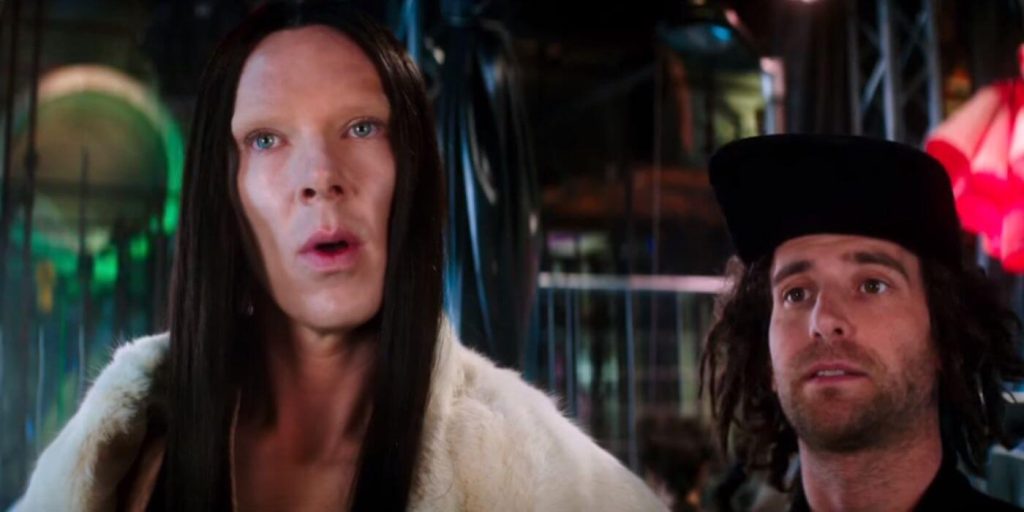World news
Benedict Cumberbatch Reflects on Controversial ‘Zoolander 2’ Role: A Lesson in Representation
The Controversy Surrounding Cumberbatch’s Role in ‘Zoolander 2’
In a recent interview, acclaimed British actor Benedict Cumberbatch addressed the backlash surrounding his portrayal of a nonbinary character in Zoolander 2 (2016). The film, a sequel to the cult-classic Zoolander (2001), featured Cumberbatch in the role of “All,” an androgynous model who was introduced in a comedic scene that many critics and members of the LGBTQ+ community found offensive.
At the time of the film’s release, the portrayal of All sparked immediate controversy. Critics argued that the character leaned heavily into outdated stereotypes and that casting a cisgender actor in the role further perpetuated Hollywood’s historical mishandling of nonbinary and gender-nonconforming representation. The backlash grew to the extent that online petitions called for boycotts of the film, highlighting the growing conversation about the importance of authentic and respectful representation in media.
Nearly a decade later, Cumberbatch has openly reflected on the controversy, acknowledging that the role “required a lot of apologies.” His remarks suggest a deep awareness of the criticisms and a willingness to engage with the discussion on representation, something that has become increasingly relevant in the entertainment industry.

Hollywood’s Troubled History with Nonbinary Representation
The controversy surrounding Cumberbatch’s role in Zoolander 2 is just one example of Hollywood’s long-standing struggle with accurate and respectful portrayals of nonbinary and gender-nonconforming individuals. For decades, mainstream cinema has either ignored nonbinary identities or depicted them through a lens of mockery, reinforcing harmful stereotypes.
Historically, nonbinary and gender-diverse characters in films have often been portrayed as comedic sidekicks, villains, or exaggerated caricatures. These depictions, rather than fostering understanding, have contributed to the marginalization of gender-nonconforming individuals. Furthermore, Hollywood has frequently cast cisgender actors in nonbinary or transgender roles, a practice that many activists and industry professionals have criticized for taking opportunities away from gender-diverse actors who could bring authenticity to these roles.
In recent years, the industry has made strides toward more inclusive casting. Films and TV shows such as Pose, Billions, and Sex Education have featured nonbinary and transgender actors in meaningful roles, demonstrating the importance of authentic representation. However, the Zoolander 2 controversy remains a reminder of how far Hollywood still has to go in terms of sensitivity and inclusivity.
Cumberbatch’s Response and Growth as an Actor
Benedict Cumberbatch’s recent comments about Zoolander 2 suggest a level of reflection and personal growth. While the role may have seemed like a harmless comedic performance at the time, the backlash made it clear that audiences expected more responsible portrayals of nonbinary identities.
Cumberbatch, known for his critically acclaimed performances in Sherlock, The Imitation Game, and Doctor Strange, has built a reputation as a thoughtful and socially conscious actor. Over the years, he has used his platform to advocate for various social issues, including gender equality, LGBTQ+ rights, and the importance of diverse representation in media.
By acknowledging the need to apologize for his role in Zoolander 2, Cumberbatch has taken responsibility for participating in a project that many found offensive. His willingness to listen, learn, and engage with conversations about representation is a positive step—one that many actors and filmmakers should follow as Hollywood continues to evolve.

The Changing Landscape of LGBTQ+ Representation in Film
The conversation around representation has evolved significantly since Zoolander 2 was released in 2016. Audiences are now more vocal about the need for diverse and authentic storytelling, and filmmakers are under greater scrutiny when it comes to casting and character development.
A major shift in Hollywood’s approach to nonbinary representation can be seen in the rise of openly nonbinary actors and creators gaining mainstream recognition. Performers like Indya Moore, Lachlan Watson, and Emma Corrin have played pivotal roles in changing how nonbinary identities are represented on screen. Additionally, films such as Everything Everywhere All at Once and Disclosure have shed light on the importance of inclusive storytelling.
Studios are also becoming more conscious of their casting choices, opting for gender-diverse actors to play gender-diverse roles. This shift is not just about political correctness—it’s about authenticity and providing opportunities for marginalized communities to tell their own stories. The backlash against Zoolander 2 played a role in accelerating this change, showing that audiences expect more from the industry.
Damn Right I Am A Los Angeles Lakers Fan Win Or Lose Unisex T-Shirt
Lessons Learned and the Future of Inclusive Storytelling
Cumberbatch’s reflections on his Zoolander 2 role highlight an important lesson: comedy and representation must evolve with society. What may have been acceptable a decade ago is now recognized as problematic, and artists have a responsibility to adapt and grow with these changes.
As Hollywood continues to push for more inclusive storytelling, filmmakers must prioritize collaboration with LGBTQ+ voices to ensure accurate and respectful portrayals. Casting nonbinary actors in nonbinary roles, consulting with advocacy groups, and avoiding outdated stereotypes are crucial steps in making progress.
For Cumberbatch, this experience serves as a reminder of the power of media to shape public perception. By acknowledging his missteps and engaging in meaningful discussions, he sets an example for other actors to recognize their impact and contribute to a more inclusive industry.
Looking ahead, Hollywood has the opportunity to learn from past mistakes and create stories that celebrate diversity rather than misrepresent it. While Zoolander 2 remains a reminder of what not to do, the industry is moving in a better direction—one that values authenticity, respect, and meaningful representation for all.
Benedict Cumberbatch’s reflections on Zoolander 2 are part of a larger conversation about inclusivity and accountability in Hollywood. As audiences demand better representation, the industry must continue to evolve, ensuring that all identities are portrayed with the dignity and respect they deserve.
From nacreboutique


